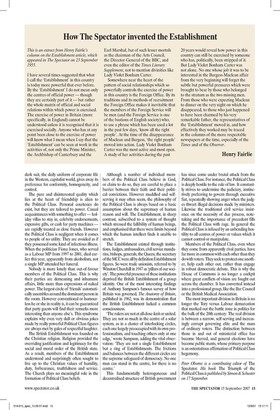How The Spectator invented the Establishment
This is an extract from Hemy Fairlie's column on the Establishment article, which appeared in The Spectator on 23 September 1955.
I have several times suggested that what I call the 'Establishment' in this country is today more powerful that ever before. By the 'Establishment' I do not mean only the centres of official power — though they are certainly part of it — but rather the whole matrix of official and social relations within which power is exercised. The exercise of power in Britain (more specifically, in England) cannot be understood unless it is recognised that it is exercised socially. Anyone who has at any point been close to the exercise of power will know what I mean when I say that the 'Establishment' can be seen at work in the activities of, not only the Prime Minister, the Archbishop of Canterbury and the Earl Marshal, but of such lesser mortals as the chairman of the Arts Council, the Director-General of the BBC, and even the editor of the Times Literary Supplement, not to mention divinities like Lady Violet Bonham Carter.
Somewhere near the heart of the pattern of social relationships which so powerfully controls the exercise of power in this country is the Foreign Office. By its traditions and its methods of recruitment the Foreign Office makes it inevitable that the members of the Foreign Service will be men (and the Foreign Service is one of the bastions of English society) who, to use a phrase which has been used a lot in the past few days, 'know all the right people'. At the time of the disappearance of Maclean and Burgess, `the right people' moved into action. Lady Violet Bonham Carter was the most active and most open. A study of her activities during the past 20 years would reveal how power in this country can still be exercised by someone who has, politically, been stripped of it. But Lady Violet Bonham Carter was not alone. No one whose job it was to be interested in the Burgess-Maclean affair from the very beginning will forget the subtle but powerful pressures which were brought to bear by those who belonged to the stratum as the two missing men. From those who were expecting Maclean to dinner on the very night on which he disappeared, to those who just happened to have been charmed by his very remarkable father, the representatives of the 'Establishment' moved in, and how effectively they worked may be traced in the columns of the more respectable newspapers at the time, especially of the Times and of the Observer.
Henry Fairlie

























































 Previous page
Previous page